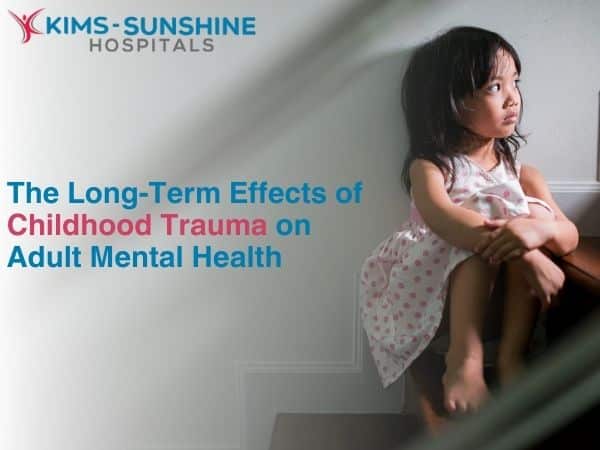
The Long-Term Effects of Childhood Trauma on Adult Mental Health

Children get affected very easily when any sudden traumatic event occurs. But they are also some of the most resilient humans we can all meet. This resilience may however be a thin façade that can break in adulthood. Trauma can be a result of any occurrence actually – may be the death of some loved one or parent, natural disaster, abuse of any kind, bullying, violence in war torn zones etc. There is a greater chance of individuals suffering from mental disorders like schizophrenia, bipolar disorder, personality disorders, anxiety, panic disorders, etc. in adulthood when they have had to deal with some traumatic event in childhood.
Can Childhood Trauma Cause Mental Health Issues Later In Life?
As to why it happens – some events can be life-altering. So our brains change permanently as a result of it – like extreme emotional sensitivity, poor impulse control, not being able to manage any stress at all, using dangerous coping mechanisms to deal with them and also adversely affecting our relationships with people around us. Our brain shows inflammation, cognitive decline or functioning that gets affected and other physical changes apart from biochemical shifts too.
Signs Of Unresolved Childhood Trauma In Adults
If you as an adult find it hard to trust others, have anxiety, too much unresolved anger or want to avoid life at all costs, then you should consider getting help. But these feelings can happen to any one and at any time, which is why you should be careful about the following signs-
- Not being to sleep properly.
- Feeling too triggered about particular stuff in life.
- Not being to control your impulse and going on a downward spiral.
- Drinking too much or clinging to drugs to cope with daily life.
- Being extra vigilant about what someone says or how they react to you.
- Not being able to focus in general.
- Having very low self esteem.
- Mental trauma can manifest as physical pain too.
- Being emotionally numb can also happen.
- Wanting to harm yourself.
- Being overly dependent on someone because you are worried that they will leave you someday.
Therapies For Dealing With Long-Term Effects Of Childhood Trauma
Our brain has an infinite capacity for learning new things, so therapy can teach you to do just that. Thinking in a different way can literally change how your brain works. Let us learn more about therapy and the different types that can be useful-
- Cognitive Processing Trauma Therapy: the individual is encouraged to see the traumatic event unfold from another perspective and they can learn to rationalise better this way and realise it was not their fault.
- Trauma-Focused Cognitive Behavioural Therapy: Here the therapist will help address issues like destructive coping mechanisms, emotional or related patterns that have come about unconsciously.
- Prolonged Exposure Therapy and Narrative Exposure Therapy: The therapist will help out by telling you everything that has happened in detail and you are forced to rationalise what happened. Exposure to the traumatic trigger can help understand what really happened.
- Eye Movement Desensitisation and Reprocessing: You are asked to recall the traumatic event as you move your eyelids slowly from one side to the other. This is successful for people who suffer from PTSD and related disorders.
- Using art and music for therapeutic purposes can also help.
Conclusion
The approach taken to deal with a traumatic event varies from one person to the next and no two plans will be the same. Everyone is different and has different perspectives and facets to face about themselves. This does not necessarily happen, unless they are exposed to the traumatic event again in the future. This may bring out destructive tendencies too which are not good. Getting help is associated with a lot of societal stigma, but it is time we changed that. Mental illness is just like a physical problem – get help when you need it and don’t feel ashamed or bad about it!
Frequently Asked Questions
Can childhood trauma lead to anxiety or depression later in life?
Yes, our brain has pathways which can change due to trauma. This means you may get depressed or have panic or anxiety related disorders in adulthood. There are other possibilities too, obviously.
How can I tell if my mental health issues are linked to childhood trauma?
If you are very angry about what happened or keep thinking about how it occurred (detailed flashbacks), depression, trust issues, risky or self destructive tendencies, want to withdraw or avoid having to deal with anything at all-then you may have some residual trauma attached to your childhood.
Can childhood trauma cause PTSD in adulthood?
Yes, due to the physical changes that occur in the brain there is a high chance that you may have to deal with PTSD in the future.
How does childhood trauma impact brain development and mental health?
Your cognitive abilities and physical and mental health get affected adversely. When this happens from childhood into adulthood the effects can be profound.
What therapies are most effective for dealing with the effects of childhood trauma?
Exposure therapy, cognitive restructuring and other forms of psychotherapy try to help by finding different approaches to help an individual understand what really happened and to rationalise why it occurred.

Dr. Nishanth Vemana
MBBS, MD Psychiatry (Kasturba Medical College, Manipal)
Consultant Psychiatrist
Subscribe to our Newsletter






